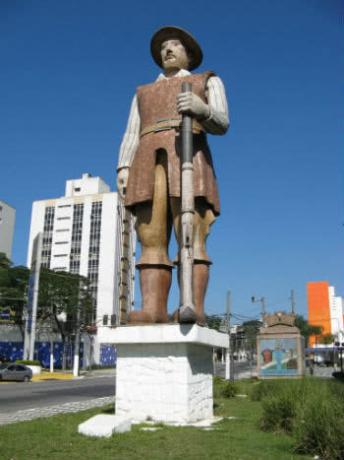Vinicius de Moraes was a Brazilian poet, playwright, writer, composer and diplomat.
He is the author of “Loyalty Sonnet”, one of the most important works of Brazilian literature, from the play “Orfeu da Conceição”, and also one of the precursors of Bossa Nova in Brazil.
It was during the second phase of modernism in Brazil that Vinicius de Moraes stood out with his erotic and love poems.
Biography

Marcus Vinitius da Cruz de Melo Moraes was born on October 9, 1913 in Rio de Janeiro.
Son of Lydia Cruz de Moraes and Clodoaldo Pereira de Moraes, only at the age of nine was he registered as Vinicius de Moraes.
He was baptized in Freemasonry in 1920 and, at the age of ten, he made his First Communion at Igreja da Matriz, in the Rio neighborhood of Botafogo.
While still a teenager, he started partnerships with the brothers Paulo, Haroldo and Oswaldo Tapajós. In 1927, with friends from Colégio Santo Inácio, he formed a musical group to play at parties.
The group consisted of Paulo and Haroldo Tapajós, Maurício Joppert and Moacir Veloso Cardoso de Oliveira.
And it was with Haroldo Tapajós that he composed the first songs, “blonde or brunette" and "song of the night”. The latter, with the participation of Paulo Tapajós.
In 1929, he became a Bachelor of Arts at Colégio Santo Inácio; and the following year, he enters the Faculty of Law at Rua do Catete.
The first published poem by Vinicius de Moraes, “The Transfiguration of the Mountain”, was edited in the magazine the order, in 1932.
Only in 1933, the same year he graduated in Law, was the poet's first book published: “The Way into the Distance”, by Schmidt Editora.
Already his second publication, "Form and Exegesis”, published by the publisher Irmãos Pongetti in 1935, receives the Felipe de Oliveira prize. It was also recognized by critics and received rave reviews from Manuel Bandeira.
He was in Lisbon accompanied by his first wife and Oswald de Andrade when he composes “Loyalty Sonnet”, in 1939. The sonnet is one of the most recognized in Vinicius de Moraes' legacy.
In 1941, he starts working in the newspaper Tomorrow as a film critic. The work is combined with the studies for the entrance exam to the diplomatic career, being successful in 1942.
He manages to reconcile his diplomatic career and works in the literary supplement of The newspaper until 1946. That year, he assumed the post of vice consul in Los Angeles, where he travels with Fernando Sabino.
In the United States, where he remained for five years without returning to Brazil, he makes contact with Brazilian musicians, such as Carmem Miranda and film critic Alex Vianny.
On a film course he decides to take in 1947, he becomes a personal friend of Orson Welles. Vinícius had a busy love life, marrying nine times.
The artist dies on July 9, 1980, a victim of pulmonary edema.
Partnerships
From 1949 to 1951, he came into contact with exponents of literature, such as the Pernambuco native João Cabral de Melo Neto – who contributed to the publication of the poem homeland. He starts to live with the Chilean Pablo Neruda and the painter Di Cavalcanti.
On his return to Brazil, in 1951, he returned to work in journalism, this time at the Last hour, where he collaborates through chronicles and remains in film criticism.
Vinicius de Moraes launches his poetic anthology, “In the evening”, work that counts on the work of Manuel Bandeira in the organization.
In the same year, one of his best-known pieces "Orpheus of the Conception” is awarded in the contest for the IV Centenary of the State of São Paulo. The play was published in the magazine Anhembi.
The piece is an adaptation of the Greek work to everyday life in Rio. He makes several attempts to finance the film format, which only occurs in 1956, with “Black Orpheus”. Before, however, the piece travels across the country.
read more:
Modernism in Brazil
Poetry of 30
Bossa nova
Partnerships with João Gilberto and Tom Jobim show promise in 1959 with the movement called “Bossa Nova”.
Vinicius and Tom's compositions are performed by João Gilberto on the album “Enough of homesickness”. The interpreter innovates and marks one of the most important movements in the history of Brazilian culture.
In 1964, after the military coup, after a long period working in the administrative work of the Itamaraty in Uruguay, he returned to Brazil. He then starts to collaborate with the magazine Facts and Photos from the newspaper Carioca Diary.
Your song "trawler” is performed by Elis Regina at the National Festival of Brazilian Popular Music on TV Excelsior.
The festivals divided the Brazilian musical production and Vinicius' song was elected the best song of the 1965 edition.
In the same year, with the song “Waltz of Love that Doesn't Come”, takes second place. The song was performed by Elizeth Cardoso.
At a time of intense cultural production, he remained in Brazil, being transferred by Itamaraty to Ouro Preto in 1967, where he organized an art festival.
The following year, due to the establishment of Institutional Act No. 5, he reads the poem “my homeland”, on the occasion of concerts in Portugal. The protest resulted in the dismissal of Vinicius de Moraes by order of President Arthur da Costa Silva.
Read too:
- Bossa nova
- MPB - Brazilian Popular Music
Works, Music and Poetry
Outside the administrative services of the federal government, he lives an intense schedule of concerts and cultural production. In 1970, he started a partnership with the singer Toquinho, one of the best known.
Together, they launch the well-known “The Dangers of this Life are Too Much" and "I know I will love you”, in 1972.
It remains in partnership with Toquinho in the following years. Together, they act in the production of the soundtrack of soap operas by Globo, such as “the beloved”, and starts working with Edu Lobo.
Your last record, “A little bit of illusion” is released in 1980. Vinicius also composed in 1939 one of the most important poems in modern poetry, "Loyalty Sonnet", published in 1946.
Loyalty Sonnet
Of everything, I will be attentive to my love before
And with such zeal, and always, and so much
That even in the face of the greatest charm
My thoughts become more enchanted
I want to live it in every moment
And in your praise I will spread my song
And laugh my laugh and shed my tears
Your grief or your contentment
And so when you come to me later
Who knows the death, anguish of those who live
Who knows loneliness, end of those who love
I can tell you about the love (that I had):
That it is not immortal, since it is flame
But let it be infinite while it lasts
The author wrote and helped set a children's music album, released in 1970. From the work, the music "The duck" is one of the best known.
The duck
here comes the duck
Paw here, paw there
here comes the duck
To see what's there.
the goofy duck
painted the mug
spanked the chicken
hit the mallard
jumped off the perch
at the horse's foot
took a kick
raised a rooster
ate a piece
from genipap
got choked
with pain in the conversation
fell into the well
broke the bowl
So many did the boy
Which went to the pan.
Phrases by Vinicius de Moraes
- “I may not have many friends, but the ones I have are the best one could ever have..”
- “I could, though not without pain, lose all my loves, but I would die if I lost all my friends.”
- “If the dog is man's best friend, then whiskey is the liquid dog.”
- “If love is fantasy, I find myself lately in the middle of carnival.”
- “Life is the art of meeting, although there are so many disagreements in this life.”
- “Life is waiting for death. make life a good passport.”



